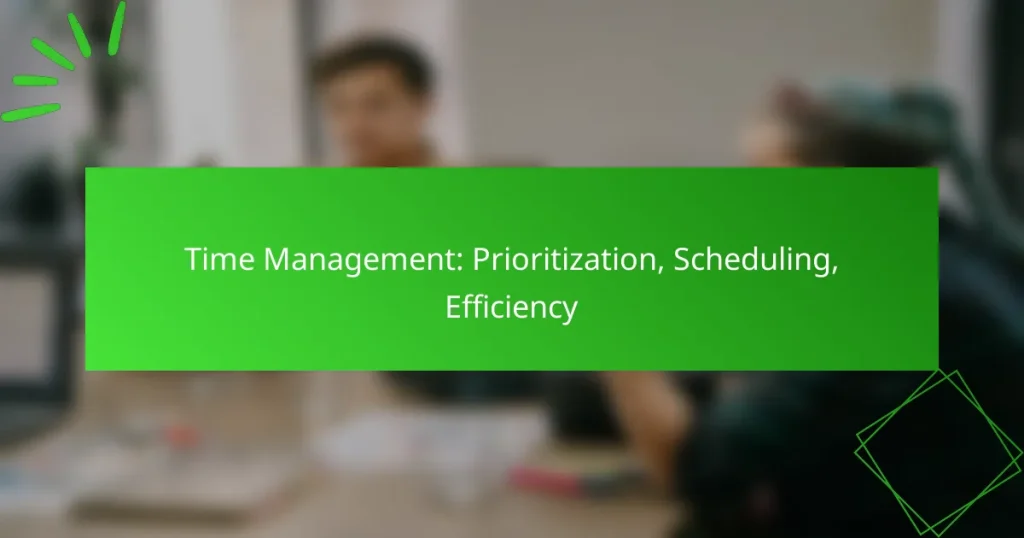Freelance journalists in the UK must cultivate a diverse set of skills to succeed in a competitive environment. Essential abilities include strong writing, effective research, and adept interviewing techniques, along with the flexibility to adapt to various media formats. By honing these skills and leveraging the right tools, freelance journalists can enhance their storytelling capabilities and streamline their workflow.
Time Management: Prioritization, Scheduling, Efficiency
Portfolio Improvement: Presentation, Diversity, Impact
Writing Techniques: Engagement, Clarity, Structure, Style
Networking Strategies: Relationship Building, Outreach, Collaboration
Interviewing Strategies: Storytelling, Engagement, Insight
Ethical Considerations: Integrity, Transparency, Accountability
What essential skills do freelance journalists need in the UK?
Freelance journalists in the UK require a mix of skills to thrive in a competitive landscape. Key abilities include research proficiency, strong writing, effective interviewing techniques, adaptability to various media formats, and networking skills.
Research proficiency
Research proficiency is crucial for freelance journalists to produce accurate and compelling stories. This skill involves not only gathering information from reliable sources but also verifying facts to ensure credibility.
Effective research can include using academic databases, government reports, and reputable news outlets. Journalists should develop a system for organizing their findings, such as using digital tools or spreadsheets, to streamline the writing process.
Strong writing ability
Strong writing ability is essential for conveying ideas clearly and engagingly. Freelance journalists must master different styles, from news articles to features, adapting their tone and structure based on the target audience.
Practicing concise writing and avoiding jargon can enhance readability. Freelancers should also be familiar with UK English conventions, including spelling and grammar rules, to maintain professionalism in their work.
Interviewing techniques
Effective interviewing techniques are vital for gathering insightful quotes and information. Journalists should prepare open-ended questions that encourage detailed responses, fostering a comfortable environment for interviewees.
Active listening is equally important; it allows journalists to ask follow-up questions that can lead to richer content. Practicing these techniques can significantly improve the quality of interviews and the resulting stories.
Adaptability to different media
Adaptability to different media formats is essential for freelance journalists, as they often work across print, online, and broadcast platforms. Each medium has unique requirements, such as word count limits for articles or time constraints for video segments.
Freelancers should familiarize themselves with the technical aspects of each medium, including SEO for online content and visual storytelling for video. This versatility can open up more opportunities and broaden their audience reach.
Networking and relationship building
Networking and relationship building are key for freelance journalists to secure assignments and gain industry insights. Establishing connections with editors, fellow journalists, and sources can lead to valuable opportunities and collaborations.
Attending industry events, joining professional organizations, and engaging on social media platforms like Twitter can help freelancers expand their network. Maintaining these relationships is crucial, as they can lead to referrals and ongoing work in the competitive journalism landscape.
How can freelance journalists improve their writing skills?
Freelance journalists can enhance their writing skills through consistent practice, targeted learning, and exposure to diverse writing styles. By engaging in daily writing, attending workshops, and reading various genres, they can refine their craft and develop a unique voice.
Practice through daily writing
Daily writing helps freelance journalists build discipline and improve their skills over time. Setting aside a specific time each day to write, even for just 15-30 minutes, can lead to significant progress.
Consider keeping a journal or starting a blog to document thoughts and experiences. This not only hones writing skills but also encourages self-reflection and creativity.
Attend writing workshops
Participating in writing workshops offers valuable feedback and guidance from experienced instructors and peers. These workshops often focus on specific genres or techniques, allowing journalists to target areas for improvement.
Look for local or online workshops that fit your schedule and budget. Many community colleges or writing organizations offer affordable options, making it accessible for freelancers at various levels.
Read widely across genres
Reading a variety of genres exposes freelance journalists to different writing styles, techniques, and perspectives. This practice can inspire new ideas and enhance their understanding of narrative structure and voice.
Set a goal to read a mix of fiction, non-fiction, journalism, and poetry. Aim for at least one book or several articles each month to broaden your literary horizons and improve your writing versatility.
What tools can enhance a freelance journalist’s workflow?
Several tools can significantly improve a freelance journalist’s workflow by streamlining collaboration, project management, and content creation. Utilizing the right software can save time and enhance productivity, allowing journalists to focus on storytelling.
Google Docs for collaboration
Google Docs is an essential tool for freelance journalists, enabling real-time collaboration with editors and other contributors. Multiple users can edit documents simultaneously, making it easy to incorporate feedback and suggestions instantly.
To maximize its potential, journalists should utilize features like comments and suggestions, which allow for clear communication without altering the original text. Always ensure that sharing settings are correctly configured to maintain document security.
Trello for project management
Trello is a versatile project management tool that helps freelance journalists organize their tasks visually. By creating boards for different projects, journalists can track deadlines, assign tasks, and monitor progress efficiently.
To get started, set up lists for various stages of your projects, such as “Ideas,” “In Progress,” and “Completed.” This visual approach can help prioritize tasks and ensure that nothing falls through the cracks. Regularly updating your Trello boards can keep your workflow on track.
Canva for visual content
Canva is a user-friendly graphic design tool that allows freelance journalists to create engaging visual content quickly. With a wide range of templates and design elements, journalists can produce eye-catching images for articles, social media, and presentations.
When using Canva, focus on maintaining brand consistency by using similar colors and fonts across your designs. Additionally, leverage the platform’s collaboration features to work with designers or editors, ensuring that visual content aligns with the overall narrative.
How do freelance journalists find clients in the UK?
Freelance journalists in the UK find clients through a combination of online platforms, networking, and job boards. Building a strong personal brand and leveraging connections are key strategies for securing work in this competitive field.
Utilizing social media platforms
Social media platforms like Twitter, LinkedIn, and Instagram are essential tools for freelance journalists to showcase their work and connect with potential clients. By sharing articles, engaging with industry discussions, and following relevant hashtags, journalists can increase their visibility and attract attention from editors and publications.
It’s important to maintain a professional profile and regularly update it with new projects and achievements. Engaging with followers and participating in conversations can also lead to valuable networking opportunities.
Networking at industry events
Attending industry events, such as journalism conferences, workshops, and local meetups, provides freelance journalists with opportunities to meet editors and other professionals. These gatherings are ideal for building relationships and learning about potential job openings.
When networking, be prepared with business cards and a brief pitch about your work. Follow up with new contacts after the event to keep the connection alive and explore collaboration possibilities.
Joining freelance job boards
Freelance job boards like Journalism.co.uk, MediaBistro, and Upwork can be valuable resources for finding clients. These platforms often list a variety of writing gigs, from short articles to long-term projects, catering to different skill levels and specialties.
When using job boards, regularly check for new postings and tailor your applications to each opportunity. Highlight relevant experience and provide samples of your work to increase your chances of being selected.
What are the best practices for pitching stories?
Effective story pitching is crucial for freelance journalists aiming to secure assignments. A successful pitch should be tailored to the publication’s audience and demonstrate the journalist’s understanding of the outlet’s style and needs.
Research the publication’s style
Understanding a publication’s style is essential before pitching. Each outlet has its own voice, tone, and formatting preferences, which can vary significantly. Review previous articles to grasp the language, structure, and topics that resonate with their audience.
Pay attention to the types of stories they publish, including word count and the use of visuals. This insight will help you align your pitch with their editorial standards, increasing the likelihood of acceptance.
Craft a compelling subject line
The subject line of your pitch is your first impression, so it needs to be engaging and informative. Aim for clarity and intrigue, using keywords that reflect the essence of your story. A strong subject line can make your pitch stand out in a crowded inbox.
For example, instead of a generic title like “Article Idea,” use something specific like “Exploring the Rise of Urban Gardening in New York.” This approach not only captures attention but also provides a clear idea of the story’s focus.
Include relevant samples of work
Including relevant writing samples can significantly enhance your pitch. Choose pieces that showcase your best work and align with the publication’s style and subject matter. This demonstrates your capability and helps editors visualize how your writing fits their needs.
When selecting samples, consider including a mix of published articles and unpublished pieces that highlight your versatility. Ensure that the samples are polished and free of errors, as they reflect your professionalism and attention to detail.
What are the legal considerations for freelance journalists?
Freelance journalists must navigate various legal considerations, including copyright laws, contracts, and defamation risks. Understanding these aspects is crucial to protect their work and maintain professional integrity.
Understanding copyright laws
Copyright laws protect original works, including articles, photographs, and videos created by freelance journalists. In most jurisdictions, the creator of the work automatically holds the copyright, but it’s essential to understand how to manage these rights when selling or licensing content.
Freelancers should be aware of the difference between exclusive and non-exclusive rights. Exclusive rights grant the buyer full control over the content, while non-exclusive rights allow the creator to sell the same work to multiple clients. Always clarify these terms in contracts to avoid misunderstandings.
Additionally, familiarize yourself with fair use provisions, which allow limited use of copyrighted material without permission. This is particularly relevant when quoting or referencing other works, but the boundaries can be vague, so caution is advised.






